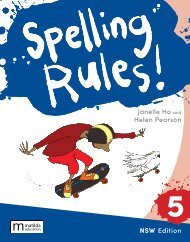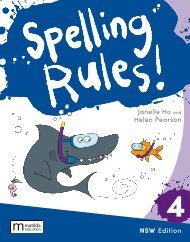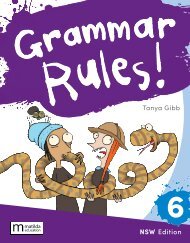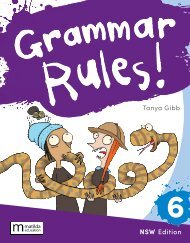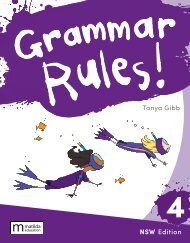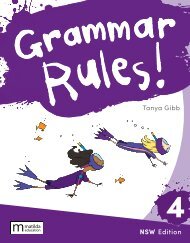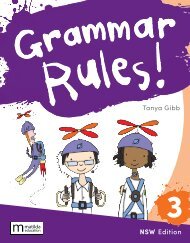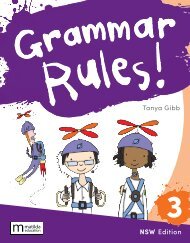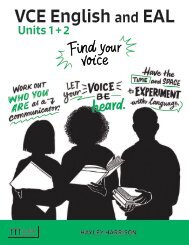Grammar Rules! NSW 5 student book sample/look inside
- No tags were found...
Create successful ePaper yourself
Turn your PDF publications into a flip-book with our unique Google optimized e-Paper software.
Tanya Gibb<br />
5<br />
<strong>NSW</strong> Edition
Tanya Gibb<br />
STUDENT<br />
BOOK<br />
5<br />
<strong>NSW</strong> Edition<br />
Name:<br />
Class:
<strong>Grammar</strong> <strong>Rules</strong>! Student Book 5<br />
<strong>NSW</strong> Edition<br />
ISBN: 978 0 6550 9245 2<br />
Designer and typesetter: Trish Hayes<br />
Illustrator: Stephen Michael King<br />
Series editor: Marie James<br />
Indigenous consultant: Al Fricker<br />
Acknowledgement of Country<br />
We acknowledge the Aboriginal and Torres Strait<br />
Islander peoples of this nation. We acknowledge the<br />
Traditional Custodians on whose unceded lands we<br />
have created this resource. We pay our respects to<br />
ancestors and Elders past and present.<br />
This edition published in 2024 by Matilda Education<br />
Australia, an imprint of Meanwhile Education Pty<br />
Melbourne, Australia<br />
T: 1300 277 235<br />
E: customersupport@matildaed.com.au<br />
W: www.matildaeducation.com.au<br />
First edition published in 2008 by Macmillan Science<br />
and Education Australia Pty Ltd<br />
Copyright © Tanya Gibb 2008, 2016, 2024<br />
The moral rights of the author have been asserted.<br />
All rights reserved. Except under the conditions<br />
described in the Copyright Act 1968 of Australia<br />
(the Act) and subsequent amendments, no part of<br />
this publication may be reproduced, in any form or<br />
by any means, without the prior written permission<br />
of the copyright owner.<br />
Educational institutions copying any part of this<br />
<strong>book</strong> for educational purposes under the Act must<br />
be covered by a Copyright Agency Limited (CAL)<br />
licence for educational institutions and must have<br />
given a remuneration notice to CAL.<br />
These limitations include: restricting the copying<br />
to a maximum of one chapter or 10% of this <strong>book</strong>,<br />
whichever is greater. For details of the CAL licence<br />
for educational institutions, please contact:<br />
Copyright Agency Limited<br />
Level 12, 66 Goulburn Street<br />
Sydney, <strong>NSW</strong> 2000<br />
Toll-free phone number (landlines only): 1800066844<br />
Telephone: (02) 9394 7600<br />
Fax: (02) 9394 7601<br />
Email: memberservices@copyright.com.au<br />
Website: https://www.copyright.com.au<br />
Publication data<br />
Author: Tanya Gibb<br />
Title: <strong>Grammar</strong> <strong>Rules</strong>! Student Book 5<br />
<strong>NSW</strong> Edition<br />
ISBN: 978 0 6550 9245 2<br />
Printed in Australia by Pegasus Media & Logistics<br />
Apr-2024
Contents<br />
Note to Teachers and Parents......................................................4<br />
Scope and Sequence......................................................................6<br />
1 A Doggy Hero.............................................................................8<br />
2 Battle for the Planets.............................................................. 10<br />
3 The Eagle Has Landed............................................................12<br />
4 The Milky Way.......................................................................... 14<br />
5 A Movie Classic........................................................................ 16<br />
6 Revision...................................................................................... 18<br />
7 Through the Doorway............................................................20<br />
8 Valentina Tereshkova..............................................................22<br />
9 Beyond Earth............................................................................24<br />
10 Greta Thunberg.......................................................................26<br />
11 Amateur Astronomer...............................................................28<br />
12 Revision......................................................................................30<br />
13 Save Planet Earth....................................................................32<br />
14 The First Astronomers.............................................................34<br />
15 Saving Onega..........................................................................36<br />
16 Does Life Exist on Other Planets?........................................38<br />
17 Life on Earth............................................................................ 40<br />
18 Revision......................................................................................42<br />
19 Save Our Wetlands................................................................ 44<br />
20 War of the Worlds................................................................... 46<br />
21 The Sky Emu............................................................................ 48<br />
22 Our Earth................................................................................. 50<br />
23 Ecological Footprint................................................................52<br />
24 Revision......................................................................................54<br />
25 Mass Panic – UFO Terrorises City....................................... 56<br />
26 Mars, the Red Planet............................................................. 58<br />
27 How is the Earth Magnetic?................................................. 60<br />
28 Who Needs Science?..............................................................62<br />
29 Animal Experimentation is Wrong....................................... 64<br />
30 Revision..................................................................................... 66<br />
31 New Message.......................................................................... 68<br />
32 What To Do If Aliens Land In Your Neighbourhood...........70<br />
33 Escape From Mars..................................................................72<br />
34 The Cost of Space................................................................... 74<br />
35 Revision......................................................................................76<br />
Glossary...........................................................................................78<br />
Writing Log.................................................. centre pull-out pages
<strong>Grammar</strong> <strong>Rules</strong>!<br />
<strong>Grammar</strong> <strong>Rules</strong>! comprehensively meets the requirements of the 2022 <strong>NSW</strong> Education Standards Authority<br />
English K–10 Syllabus Rationale, which recognises that knowledge, skills, values and attitudes acquired<br />
in English enable <strong>student</strong>s to become ‘confident communicators, critical and imaginative thinkers, lifelong<br />
learners and informed, active participants in Australian society.’<br />
Learning in English is recursive and accumulative, so each <strong>student</strong> work<strong>book</strong> in the <strong>Grammar</strong> <strong>Rules</strong>! series is<br />
designed to build on the concepts covered previously and for an expanding range of purposes and audiences.<br />
<strong>Grammar</strong> <strong>Rules</strong>! provides a conceptually sound, scope and sequence of context-based activities that support<br />
teaching and learning in English. Although the title for the series is <strong>Grammar</strong> <strong>Rules</strong>!, the series in not just<br />
about grammar. Each unit of work in the series begins at the level of the whole text by identifying purpose<br />
and audience for the model text, providing teaching opportunities to activate <strong>student</strong>s’ background knowledge<br />
of the topic or the text type, and then supporting <strong>student</strong>s in reading comprehension. The texts provided<br />
can be used for discussion of text forms and features and sentence structures, as well as for vocabulary<br />
expansion. The texts can also be used as models for <strong>student</strong>s to use when creating their own written, spoken<br />
or multimodal texts. The texts included in <strong>Grammar</strong> <strong>Rules</strong>! cover a variety of informative, imaginative and<br />
persuasive texts and hybrid texts that use elements of different types of texts.<br />
<strong>Grammar</strong> <strong>Rules</strong>! also teaches the conventions of punctuation and some aspects of spelling (for example,<br />
plural nouns, suffixes and prefixes); literary elements such as onomatopoeia, rhyme and alliteration; and the<br />
way visual elements function to support or construct meaning. Other areas of the English K–10 Syllabus<br />
covered in <strong>Grammar</strong> <strong>Rules</strong>! include critical reading and reflecting on character, setting and plot in narrative<br />
texts (literature).<br />
Student Book 5<br />
Units of work<br />
Student Book 5 contains 35 weekly units of work presented in a conceptually sound scope and sequence.<br />
The intention is for <strong>student</strong>s to work through the units in the sequence in which they are presented. See<br />
the Scope and Sequence Chart on pages 6–7 for more information. There are regular Revision Units that<br />
can be used for consolidation or assessment purposes.<br />
The <strong>sample</strong> texts in Student Book 5 are not tied to any particular content across other curriculum areas, but<br />
are generally based on the theme of space and earth. This allows teachers and <strong>student</strong>s to focus on the way<br />
language is structured in the different types of texts according to purpose and audience. Students can then<br />
use this knowledge to critically evaluate, respond to and create texts in other learning areas.<br />
Icons<br />
Note to teachers and parents<br />
Encourages <strong>student</strong>s to create texts of their own to demonstrate their understanding of the<br />
text structures and features taught in the unit. These activities focus on written language;<br />
however, many also provide opportunities for using spoken language to engage with others,<br />
make presentations and develop skills in using ICT resources.<br />
Highlights useful grammatical rules<br />
and concepts. The rule is always<br />
introduced the first time <strong>student</strong>s<br />
need it to complete an activity.<br />
Tells <strong>student</strong>s that a special hint is<br />
provided for an activity. It might be a tip<br />
about language features or a reminder<br />
to <strong>look</strong> at a rule in a previous unit.<br />
<strong>Grammar</strong> <strong>Rules</strong>! Glossary<br />
A valuable glossary is provided at the end of Student Book 5. Teachers and <strong>student</strong>s can use this as a reference<br />
for terminology and rules covered in Student Book 5. Page references are also given for the point in the <strong>book</strong><br />
where the rule was first introduced, so that <strong>student</strong>s can go back to that unit if they need more information<br />
or further revision of the concept.<br />
4 <strong>Grammar</strong> <strong>Rules</strong>! Student Book 5 (ISBN 9780655092452) © Tanya Gibb
<strong>Grammar</strong> <strong>Rules</strong>! Student Book 5 (ISBN 9780655092452) © Tanya Gibb<br />
<strong>Grammar</strong> <strong>Rules</strong>! Student Book 5 (ISBN 9780655092452) © Tanya Gibb<br />
<strong>Grammar</strong> <strong>Rules</strong>! Student Book 5 (ISBN 9780655092452) © Tanya Gibb<br />
<strong>Grammar</strong> <strong>Rules</strong>! Student Book 5 (ISBN 9780655092452) © Tanya Gibb<br />
Pull-Out Writing Log<br />
At the centre of Student Book 5 is a practical pull-out Writing Log so that <strong>student</strong>s can keep track of the<br />
texts they have created or attempted to create. The Writing Log also includes a handy reminder of the<br />
writing process, as well as a checklist of types of texts for <strong>student</strong>s to try.<br />
<strong>Grammar</strong> <strong>Rules</strong>!<br />
Create symbols<br />
for a rating scale.<br />
Then each time<br />
you finish a piece<br />
of writing, record<br />
it in the log.<br />
Date<br />
Write the<br />
date.<br />
Write the title of<br />
your text.<br />
Write the title of your<br />
piece.<br />
Text purpose<br />
Audience Language features My rating Where to next?<br />
and structure<br />
e.g. recount/ Who were you List the main grammar and other language Record your What elements of language could<br />
email<br />
writing for or to? features that you used.<br />
rating.<br />
you try next?<br />
How could you improve your writing?<br />
I've tried these types of texts and text forms . . .<br />
Narrative<br />
Story<br />
Play script<br />
Comic<br />
<strong>Rules</strong><br />
Directions<br />
Explanation<br />
Magazine article<br />
I<br />
Plan<br />
What is the purpose of the text?<br />
Who is the target audience?<br />
What type of text and text features will you use?<br />
What mode or medium will enhance the<br />
presentation?<br />
Gather ideas or research the topic, including<br />
using online and digital sources.<br />
3<br />
Edit/Revise<br />
Check your work for meaning, clarity and<br />
precision.<br />
Is the structure and sequencing appropriate?<br />
Check paragraphing and sentence structures.<br />
Check topic specific vocabulary.<br />
Ask for help to improve your text.<br />
's Writing Log<br />
2<br />
Draft<br />
Gather and organise your ideas.<br />
Use a graphic organiser or<br />
digital tools.<br />
Compose your text.<br />
4<br />
Proofread<br />
Check grammar and<br />
punctuation.<br />
Check homonyms are correct.<br />
Use online dictionaries to check<br />
spelling.<br />
5<br />
Publish<br />
Use layout and visual features.<br />
Use digital tools.<br />
Reflect on your work and your<br />
text.<br />
My rating scale<br />
Symbol<br />
Do you need<br />
some ideas<br />
for other text<br />
forms to try?<br />
Look at the<br />
back page!<br />
Meaning<br />
Ballad<br />
Retelling a story<br />
Poem<br />
Song<br />
Other<br />
Recount<br />
Letter/email<br />
Biography<br />
Autobiography<br />
News article<br />
Imaginative recount<br />
Other<br />
Description<br />
Poem<br />
Story<br />
Play script<br />
Biography<br />
Advertisement<br />
Narrative/story<br />
Other<br />
Informative<br />
Information report<br />
Website/brochure/leaflet/poster<br />
Magazine article<br />
Documentary<br />
Biography<br />
Other<br />
Procedure<br />
Recipe<br />
Instructions<br />
Cycle diagram/flow chart<br />
Digital chart<br />
Persuasion<br />
Debate<br />
Argument/speech<br />
Letter to editor<br />
Editorial<br />
TV advertisement<br />
Magazine advertisement<br />
Radio advertisement<br />
Leaflet<br />
Music video<br />
Blog<br />
Poem/song lyrics<br />
Other<br />
Discussion<br />
Conversation<br />
TV interview<br />
Talkback radio<br />
Dialogue in a story<br />
Panel discussion<br />
Formal interview<br />
Other<br />
Response/Reflection<br />
Review (film, <strong>book</strong>, concert, excursion)<br />
Diary or journal<br />
Poem<br />
Other<br />
i<br />
ii<br />
iii<br />
iv<br />
Unit At A Glance<br />
Unit tag<br />
States the main<br />
language focus<br />
Type of text<br />
Highlights the<br />
type of text and<br />
purpose of the<br />
<strong>sample</strong> text<br />
Rule!<br />
Introduces<br />
<strong>student</strong>s to a<br />
new concept<br />
Text <strong>sample</strong><br />
Provides a context for<br />
learning about language<br />
25<br />
I<br />
Emotive language,<br />
reported (indirect)<br />
speech, inclusive<br />
language<br />
Daily Chronicle, 1 April 2046<br />
MASS PANIC – UFO TERRORISES CITY<br />
Naarm came to a sudden<br />
standstill today as people<br />
abandoned cars and workplaces,<br />
terrified, as a UFO, the size of<br />
three football fields, ominously<br />
hovered above the city.<br />
As yet, officials have been<br />
unable to communicate with<br />
the saucer. Police, emergency<br />
services and defence personnel<br />
are liaising to coordinate their<br />
strategies and any response to<br />
an attack by the UFO on the city.<br />
Speculation, at this stage,<br />
suggests the saucer is a solitary<br />
vessel. Police Commissioner<br />
Gowri Neal has confirmed that<br />
no other spaceships have been<br />
sighted.<br />
Police are urging all citizens<br />
to stay <strong>inside</strong> their homes<br />
and not panic. They are also<br />
advising sightseers to remain<br />
clear of the area until it can<br />
be determined whether or not<br />
the UFO is a threat.<br />
Read Mass Panic – UFO Terrorises City. Write five emotive words it uses that sensationalise the topic. Then<br />
suggest a non-sensational synonym for each one. Hint! Synonyms are words that are similar in meaning.<br />
monstrous<br />
2<br />
3<br />
4<br />
This informative<br />
text is a news<br />
article. It uses<br />
emotive language<br />
to sensationalise<br />
the news.<br />
big<br />
Write the adverb that tells how the UFO hovered. What does it mean?<br />
Reported (indirect) speech is speech that is not quoted directly. It does not need<br />
quotation marks.<br />
Police Commissioner Gowri Neal has confirmed that the aliens have taken over.<br />
Why does the newspaper include Police Commissioner Gowri Neal’s reported speech?<br />
Add to the newspaper article. Include the reported speech of a military commander to give the<br />
military’s perspective on the UFO.<br />
Sequenced activities<br />
Activities focus on<br />
reading comprehension,<br />
text features and<br />
structures, grammar,<br />
vocabulary or punctuation<br />
Rewrite the quoted speech as reported speech.<br />
Write a news report about a UFO landing in your community. Use emotive<br />
language to sensationalise the report. Include the quoted or reported<br />
speech of witnesses.<br />
56 <strong>Grammar</strong> <strong>Rules</strong>! Student Book 5 (ISBN 9780655092452) © Tanya Gibb<br />
<strong>Grammar</strong> <strong>Rules</strong>! Student Book 5 (ISBN 9780655092452) © Tanya Gibb<br />
57<br />
5<br />
‘The UFO is terrifying!’ cried a Melbourne worker.<br />
‘We’ve been unable to communicate,’ said Police Commissioner Gowri Neal.<br />
‘I’m so excited,’ said one witness. ‘I’m taking lots of photos!’<br />
‘I think it’s a solitary vessel,’ suggested one reporter.<br />
‘Stay clear of the area,’ the police officer warned the public.<br />
6<br />
Rewrite each sentence using gender inclusive language.<br />
Mankind can no longer afford to be complacent about the environment.<br />
Every <strong>student</strong> is required to bring her own lunch on the excursion.<br />
When any president visits the city, he stays at the conference venue.<br />
Cavemen developed simple tools to assist him in his daily life.<br />
Phone all the schools and ask each principal if he can attend our meeting.<br />
7<br />
Use gender inclusive language when you don’t want to exclude one gender or show bias.<br />
gender exclusive Mankind is creating climate change.<br />
gender inclusive People are creating climate change.<br />
Consider the headline Mass Panic – UFO Terrorises City. Would the headline attract readers’<br />
attention? Does the headline match what is covered in the article? Explain.<br />
Tip!<br />
Reminds or gives<br />
a special hint<br />
Try it yourself!<br />
Gives <strong>student</strong>s<br />
opportunities to apply<br />
their knowledge and skills<br />
to create their own texts.<br />
Students can engage in<br />
planning, drafting and<br />
editing their texts and using<br />
different modes and media<br />
to enhance presentation of<br />
their texts.<br />
<strong>Grammar</strong> <strong>Rules</strong>! Teacher Resource Book 3-6<br />
Full teacher support for Student Book 5 is provided by <strong>Grammar</strong> <strong>Rules</strong>! Teacher Resource Book 3–6.<br />
Here you will find valuable background information about teaching English along with practical resources, such as:<br />
T strategies for teaching text structures and features<br />
<strong>Grammar</strong> <strong>Rules</strong>! Student Book 5 (ISBN 9780655092452) © Tanya Gibb<br />
T grammar and punctuation wall charts<br />
T literacy games and activities T teaching tips for every unit in Student Book 5<br />
T assessment strategies T answers for every unit in Student Book 5.<br />
5
Scope and Sequence<br />
This scope and sequence chart is based on the requirements of the <strong>NSW</strong> English K–10 Syllabus.<br />
Unit<br />
Unit name<br />
Type of text<br />
Purpose of<br />
text<br />
Clauses, sentences,<br />
conjunctions,<br />
connectives<br />
Nouns, noun<br />
groups,<br />
pronouns,<br />
adjectives<br />
Verbs and<br />
verb groups<br />
Adverbs,<br />
adverbials,<br />
prepositional<br />
phrases<br />
Elements of<br />
language<br />
1<br />
A Doggy Hero<br />
Report<br />
to inform<br />
clauses, sentences,<br />
conjunctions<br />
personal<br />
pronouns<br />
2<br />
Battle for the<br />
Planets<br />
Narrative<br />
to entertain<br />
noun groups,<br />
adjectives,<br />
adjectival phrases<br />
verb group,<br />
auxiliary<br />
verbs<br />
subject-verb<br />
agreement<br />
3<br />
The Eagle Has<br />
Landed<br />
Newspaper article<br />
to inform<br />
clauses, complex<br />
sentences,<br />
subordinating<br />
conjunctions<br />
commas<br />
4<br />
The Milky Way<br />
Poem<br />
to entertain<br />
to inspire<br />
to reflect<br />
noun groups,<br />
adjectives,<br />
adjectival clauses<br />
main idea,<br />
personification,<br />
alliteration<br />
5<br />
A Movie Classic<br />
Review<br />
to respond<br />
to persuade<br />
verb groups,<br />
modal verbs<br />
modal<br />
adverbs<br />
modality, prefixes,<br />
antonyms<br />
6<br />
REVISION<br />
7<br />
Through the<br />
Doorway<br />
Narrative<br />
to entertain adverbial clauses adverbial<br />
phrases,<br />
adverbs<br />
orientation, setting,<br />
mystery<br />
8<br />
Valentina<br />
Tereshkova<br />
Biography<br />
to inform clauses noun groups,<br />
pronouns<br />
verbs, verb<br />
groups, tense,<br />
auxiliary verbs<br />
cohesion<br />
9<br />
Beyond Earth<br />
Advertisement<br />
to persuade<br />
conjunctions, complex<br />
sentences<br />
verbs<br />
emotive language,<br />
modality<br />
10<br />
Greta Thunberg<br />
Biography<br />
to inform complex sentences possessive<br />
apostrophes,<br />
possessive<br />
pronouns<br />
adverbial<br />
phrases<br />
subjective and<br />
objective language<br />
11<br />
Amateur<br />
Astronomer<br />
Recount<br />
to inform<br />
auxiliary<br />
verbs, past<br />
tense<br />
adverbs,<br />
adverbial<br />
phrases<br />
12<br />
REVISION<br />
13<br />
Save Planet Earth<br />
Discussion –<br />
talkback radio<br />
to persuade<br />
to share<br />
opinions<br />
quoted speech verb groups punctuation,<br />
modality<br />
14<br />
The First<br />
Astronomers<br />
Report<br />
to inform clauses singular and<br />
plural nouns<br />
verb groups<br />
suffixes,<br />
nominalisation<br />
15<br />
Saving Onega<br />
Narrative<br />
to entertain clauses, sentences noun groups,<br />
adjectives<br />
formal and<br />
informal language<br />
16<br />
Does Life Exist on<br />
Other Planets?<br />
Discussion<br />
to persuade<br />
to inform<br />
to entertain<br />
conjunctions, text<br />
connectives<br />
acronyms<br />
17<br />
Life on Earth<br />
Information<br />
report<br />
to inform<br />
statements and<br />
questions<br />
relating verbs,<br />
auxiliary<br />
verbs<br />
subjective and<br />
objective language<br />
18<br />
REVISION<br />
6 <strong>Grammar</strong> <strong>Rules</strong>! Student Book 5 (ISBN 9780655092452) © Tanya Gibb
Unit<br />
Unit name<br />
Type of text<br />
Purpose of<br />
text<br />
Clauses, sentences,<br />
conjunctions,<br />
connectives<br />
Nouns, noun<br />
groups,<br />
pronouns,<br />
adjectives<br />
Verbs and<br />
verb groups<br />
Adverbs,<br />
adverbials,<br />
prepositional<br />
phrases<br />
Elements of<br />
language<br />
19<br />
Save Our Wetlands<br />
Speech<br />
to persuade paragraphs, sentences noun groups auxiliary verbs,<br />
tense<br />
formal language,<br />
synonyms<br />
20<br />
21<br />
War of the Worlds<br />
Review<br />
The Sky Emu<br />
Report<br />
Explanation<br />
to persuade statements, exclamations adverbs subjective<br />
(evaluative)/<br />
objective language<br />
to explain dependent clauses commas, objective<br />
or subjective<br />
language<br />
22<br />
Our Earth<br />
Poem<br />
to describe<br />
to reflect<br />
noun groups<br />
adverbial<br />
phrases<br />
figurative language<br />
23<br />
Ecological<br />
Footprint<br />
Report<br />
to inform<br />
clauses, sentences,<br />
conjunctions<br />
Greek and Latin<br />
word roots<br />
24<br />
REVISION<br />
25<br />
Mass Panic – UFO<br />
Terrorises City<br />
News report<br />
to inform<br />
to entertain<br />
reported and quoted<br />
speech<br />
emotive language,<br />
inclusive language<br />
26<br />
Mars, the Red<br />
Planet<br />
Report<br />
to inform<br />
to describe<br />
adjectives,<br />
adjectival phrases,<br />
noun groups<br />
verbs<br />
27<br />
How is the Earth<br />
Magnetic?<br />
Scientific<br />
explanation<br />
to explain tense, verbs adverbial<br />
phrases<br />
technical<br />
terminology<br />
28<br />
29<br />
30<br />
Who Needs<br />
Science?<br />
Speech<br />
Animal<br />
Experimentation<br />
is Wrong<br />
Debate<br />
connectives, sentences modal verbs modal adverbs modality, addressing<br />
an audience<br />
(formal/informal)<br />
sentences and clauses noun groups subjective and<br />
emotive language<br />
REVISION<br />
31<br />
New Message<br />
Text message<br />
to inform<br />
to complain<br />
noun groups<br />
verb groups,<br />
auxiliary verbs<br />
adverbial<br />
phrases<br />
metaphor, simile,<br />
idiom, informal<br />
language<br />
32<br />
What To Do If<br />
Aliens Land In Your<br />
Neighbourhood<br />
Instructions<br />
to entertain<br />
commands, conjunctions,<br />
connectives<br />
tense, auxiliary<br />
verbs<br />
tongue-in-cheek<br />
humour, cohesion<br />
33<br />
Escape From Mars<br />
Narrative<br />
to entertain pronouns first- and thirdperson<br />
narrator<br />
34<br />
The Cost of Space<br />
Discussion<br />
to persuade<br />
to express<br />
opinions<br />
connectives<br />
nouns, noun<br />
groups, pronoun<br />
reference<br />
cohesion, point of<br />
view<br />
35<br />
REVISION<br />
<strong>Grammar</strong> <strong>Rules</strong>! Student Book 5 (ISBN 9780655092452) © Tanya Gibb<br />
7
1<br />
Clauses,<br />
conjunctions,<br />
personal<br />
pronouns<br />
This text is informative.<br />
It uses a variety of<br />
sentence types. The<br />
title conveys the<br />
writer’s opinion of the<br />
subject of the text.<br />
A Doggy Hero<br />
The first animal to orbit Earth was a dog named<br />
Laika. She was sent to space in a Soviet Union<br />
spacecraft named Sputnik II in 1957. Laika was<br />
a stray dog caught on the streets of Moscow.<br />
She was nicknamed ‘Muttnik’ by the American<br />
media. While in space, Laika’s heart rate and<br />
other vital signs were monitored so that scientists<br />
could determine whether it was safe to send<br />
humans into orbit. She was harnessed into the<br />
spacecraft. The mission was not a return mission,<br />
and there was never any intention to bring Laika<br />
home. Scientists believe Laika overheated in the<br />
spacecraft and died within seven days.<br />
I<br />
Read A Doggy Hero. Why is Laika referred to as a hero?<br />
2<br />
Why was Laika nicknamed Muttnik?<br />
A clause is a unit of meaning that includes a verb. A simple sentence is one clause.<br />
Conjunctions link clauses to form compound and complex sentences.<br />
and so because but or until<br />
3<br />
Circle the conjunctions in the sentences below. Underline the verbs.<br />
Laika was born in Moscow and she became a very famous Russian dog.<br />
Laika was the first animal to orbit the Earth and she became famous.<br />
Laika was harnessed into the spacecraft but she could reach her food and water.<br />
Laika was the first animal to orbit Earth but she was not the first animal in space.<br />
4<br />
Cross out the incorrect conjunction in each example.<br />
Laika overheated (so/or) she died.<br />
Laika died (so/because) Sputnik II’s heat shield failed.<br />
The dog’s name was Laika (but/so) the media called her ‘Muttnik’.<br />
5<br />
A Doggy Hero has not been written in paragraphs. Draw a dividing line in the text where you think<br />
each paragraph should begin.<br />
8 <strong>Grammar</strong> <strong>Rules</strong>! Student Book 5 (ISBN 9780655092452) © Tanya Gibb
6<br />
A complex sentence has two or more clauses. One of the clauses is the main<br />
(independent) clause. The other clauses in the sentence are dependent clauses.<br />
They depend on the main clause to fully make sense.<br />
Join the sentences using conjunctions.<br />
Laika was harnessed into the spacecraft. She couldn’t move around.<br />
Russian scientists said Laika showed no ill effects from her space flight. She overheated. She died.<br />
Laika was a stray dog. No-one objected to sending Laika into space.<br />
Laika died in space. She became famous.<br />
Personal pronouns replace or refer to nouns for people, places, animals and things.<br />
I me you we us he him she her they them it<br />
7<br />
8<br />
Circle the personal pronouns in A Doggy Hero.<br />
Use a personal pronoun from the box to complete each sentence.<br />
him he it it her she<br />
Laika ate her dinner and then<br />
licked her lips.<br />
Ralph, the dog, sat under his favourite tree while<br />
I bought a new lunch box and took<br />
to school.<br />
My cat was sick so I took<br />
to the vet.<br />
Lena doesn’t like it when I tickle .<br />
Russell is funny, but don’t tell<br />
I said so!<br />
waited for dinner.<br />
9<br />
Rewrite the pair of sentences as one sentence. Use a conjunction and a personal pronoun.<br />
Elena and Frankie went to the park. Elena and Frankie needed some fresh air.<br />
Find out about some other animals that were sent into space, such as spiders,<br />
monkeys or mice. Write an information report. Use conjunctions to connect<br />
clauses in the sentences. Use pronouns to refer to the animals.<br />
<strong>Grammar</strong> <strong>Rules</strong>! Student Book 5 (ISBN 9780655092452) © Tanya Gibb<br />
9
2<br />
Nouns<br />
groups,<br />
verb groups<br />
This orientation for a<br />
narrative has a thirdperson<br />
narrator. It<br />
uses noun groups to<br />
describe the characters<br />
and the setting.<br />
Battle for the Planets<br />
In the deep wilderness of space, there lived a peaceful community of<br />
Ferlings. The Ferlings were kind, gentle, nomadic creatures. For centuries,<br />
they had roamed from planet to planet, constantly under threat of attack<br />
by the not-so-friendly Grimlies, of the planet Grima.<br />
One day, a group of Ferlings was collecting sweet, juicy Moonberries and<br />
tasty little Jupiternuts when they realised that a gang of huge, fierce<br />
Grimlies was moving towards them. They immediately hid behind a nearby<br />
rocky outcrop, hoping that they hadn’t been seen and waited until they<br />
thought the coast was clear before stepping out.<br />
They were wrong! The Grimlies were waiting for them.<br />
I<br />
Narratives are based on one or more themes. Read Battle for the Planets. Which of the following<br />
themes might apply to Battle for the Planets?<br />
love hate family survival greed good vs evil courage revenge loyalty death<br />
prejudice power freedom war betrayal justice/injustice<br />
Nouns name people, places, animals, things and ideas. A noun group is a group of<br />
words built around a noun to give a more detailed description. A noun group can<br />
include an article (a, an, the), adjectives that describe (spectacular, dangerous)<br />
and an adjectival phrase (the distant planet with the red ocean).<br />
2<br />
Write a noun group for each noun below. Use words from the narrative or your own words.<br />
Ferlings<br />
space<br />
Grimlies<br />
planet<br />
3<br />
Create an interesting noun group for each noun below.<br />
friend<br />
homework<br />
feet<br />
dog<br />
class<br />
10 <strong>Grammar</strong> <strong>Rules</strong>! Student Book 5 (ISBN 9780655092452) © Tanya Gibb
4<br />
5<br />
Underline the personal pronouns in Battle for the Planets. Write the nouns/noun groups that the<br />
pronouns refer to.<br />
Ferlings and Grimlies each begin with a capital letter because they are proper nouns. They are the<br />
names for creatures from particular places. Write the proper nouns for people from the following places.<br />
Australia<br />
Iraq<br />
Japan<br />
Somalia<br />
Earth<br />
Germany<br />
Philippines<br />
Spain<br />
Rule!<br />
Verbs are words for actions, saying, thinking (and feeling) and relating.<br />
A verb group can include a verb and an auxiliary (helping) verb.<br />
is called had vanished hadn’t been seen<br />
wasn’t sleeping are trying<br />
6<br />
Underline the auxiliary (helping) verb in each sentence. Circle the verb groups.<br />
The alien was flying.<br />
The Ferlings are collecting berries.<br />
The star has exploded.<br />
The children were giggling.<br />
The Grimly was shouting.<br />
Joseph is jumping.<br />
The form of the verb must agree with its singular or plural subject.<br />
We were scared. Lia was scared. They scare easily. Max scares easily.<br />
Collective nouns are singular. The gang was coming.<br />
7<br />
8<br />
Circle the collective nouns in Battle for the Planets.<br />
Circle the auxiliary (helping) verb that agrees with each underlined noun.<br />
A group of Grimlies (are/is) setting a trap.<br />
The dogs (were/was) running through the park.<br />
A pack of wolves (was/were) hunting.<br />
The seagulls (is/are) flying overhead.<br />
The boy (is/are) going to be late.<br />
The pod of whales (are/is) moving north past Moreton Bay.<br />
The herd (is/are) heading for the river.<br />
Write an ending for the narrative Battle for the Planets. Or write a narrative<br />
of your own about creatures from outer space. Create interesting descriptions<br />
of characters and settings using noun groups with adjectives.<br />
<strong>Grammar</strong> <strong>Rules</strong>! Student Book 5 (ISBN 9780655092452) © Tanya Gibb<br />
11
3<br />
Clauses,<br />
conjunctions,<br />
commas<br />
This newspaper<br />
article uses complex<br />
sentences to convey<br />
the information.<br />
Daily News, 20 July 1969<br />
THE EAGLE HAS LANDED<br />
An estimated 700 million<br />
people around the world<br />
watched in awe as the lunar<br />
module Eagle landed in the<br />
dusty Sea of Tranquillity,<br />
and its Commander, Neil<br />
Armstrong, and Lunar Module<br />
Pilot, Edwin ‘Buzz’ Aldrin,<br />
stepped onto the surface of<br />
the Moon, while the Command<br />
Module Pilot, Michael Collins,<br />
orbited above them.<br />
Apollo 11 was launched on<br />
16th July from the Kennedy<br />
Space Center in Florida. The<br />
astronauts spent two and a<br />
half hours on the surface taking<br />
photographs, collecting rocks<br />
and drilling for core <strong>sample</strong>s.<br />
Conjunctions can join a dependent clause to a main (independent) clause.<br />
while since after when before if unless although therefore<br />
because as as if<br />
I<br />
2<br />
Read The Eagle has Landed. The first paragraph is a single sentence with four clauses.<br />
Mark where each clause begins.<br />
Hint! Look for the conjunctions as, and and while. They function to link clauses.<br />
Also remember, a clause must contain a verb. Underline the verbs.<br />
Write the clauses from question 1 as four simple sentences that make statements.<br />
3<br />
Mark the clauses in the sentences. Hint! Find the conjunctions and the verbs first.<br />
Over half a billion people watched televisions around the world as Armstrong climbed down<br />
the ladder of the lunar module and took his first footstep on the Moon’s surface.<br />
Aldrin joined Armstrong on the lunar surface and described the moonscape as ‘magnificent<br />
desolation’.<br />
The astronauts were trained to control all equipment and land the module themselves if the<br />
computers broke down.<br />
12 <strong>Grammar</strong> <strong>Rules</strong>! Student Book 5 (ISBN 9780655092452) © Tanya Gibb
4<br />
Use conjunctions to join each group of simple sentences to create complex sentences.<br />
The Daily News sold out on 20th July. The paper had to be reprinted. Everyone wanted souvenir<br />
copies of the paper.<br />
Armstrong and Aldrin walked on the Moon. Collins orbited above the Moon. The team on Earth<br />
watched excitedly.<br />
5<br />
Every clause needs a verb. Circle the verb<br />
in each row.<br />
watched lunar ship astronaut<br />
Moon dust rock landed<br />
newspaper stepped daily space centre<br />
Michael orbited while surface<br />
6<br />
Tick the box for each row below that is a<br />
sentence. Add sentence punctuation where it<br />
is needed.<br />
the astronauts collected materials<br />
rocks, soil and dust<br />
they reprinted the paper<br />
souvenir copies of the paper<br />
the Kennedy Space Center<br />
Commas are punctuation marks that are used to separate:<br />
• words in a list (apples, bananas and oranges)<br />
• a phrase in a sentence (After lunch, we went for a walk.)<br />
• a dependent clause in a sentence where the dependent clause comes<br />
first (While orbiting above the moon, Collins did safety checks.).<br />
7<br />
Add commas to these sentences to make the meaning clear.<br />
During their walk Armstrong and Aldrin collected rocks soil and dust from the surface.<br />
Because of their Moon mission Neil Armstrong Buzz Aldrin and Michael Collins are very famous.<br />
During his time in orbit Collins checked his instruments and equipment.<br />
After the worker was injured workplace rules have become more strict.<br />
The astronauts took photos collected rocks and drilled for core <strong>sample</strong>s.<br />
Choose a famous event in history to research. Write a news article about<br />
it. How did people react to the event at the time? Include statements from<br />
witnesses and experts.<br />
<strong>Grammar</strong> <strong>Rules</strong>! Student Book 5 (ISBN 9780655092452) © Tanya Gibb<br />
13
4<br />
Noun groups,<br />
adjectives,<br />
adjectival<br />
clauses<br />
This poem<br />
uses noun groups<br />
and adjectives to<br />
describe the Milky<br />
Way galaxy.<br />
A spiral galaxy.<br />
The Milky Way<br />
A hungry galaxy,<br />
A dusty, gassy, pinwheel consuming<br />
with a massive black hole other galaxies<br />
at its centre,<br />
and growing<br />
surrounded by 200 billion over time<br />
stars.<br />
– billions of years of time.<br />
Some in clusters.<br />
An ancient galaxy,<br />
Some young.<br />
nearly as old as the universe itself.<br />
Some old.<br />
So vast.<br />
Some brighter than our Sun. So much unknown.<br />
Some obscured by space dust A pinwheel in space<br />
but<br />
holding our solar system,<br />
still luminous,<br />
our Earth,<br />
spiralling in the night sky, our sun<br />
strung together by gravity. on just one arm.<br />
A noun group can include adjectives that quantify or tell number<br />
(one galaxy, some authors, many people), determiners that point out<br />
(this space suit, those stars) and classifying adjectives (apple pie).<br />
I<br />
2<br />
3<br />
Read The Milky Way. Underline the adjectives that describe.<br />
In The Milky Way, circle three noun groups that include a classifying adjective.<br />
Find and write two noun groups in The Milky Way that include words that quantify or tell number.<br />
4<br />
What is the main idea in the poem? Hint! This is the idea the poet wants you to accept or understand.<br />
How do you think the poet feels about the Milky Way?<br />
5<br />
Personification is when human qualities are given to non-human things. What human qualities does<br />
the poet give to the Milky Way?<br />
6<br />
Some poems use alliteration. Recite The Milky Way. Did you notice any<br />
letter sound that is used more frequently than other sounds? What is it?<br />
14 <strong>Grammar</strong> <strong>Rules</strong>! Student Book 5 (ISBN 9780655092452) © Tanya Gibb







